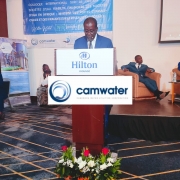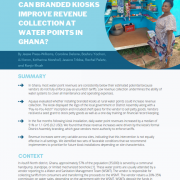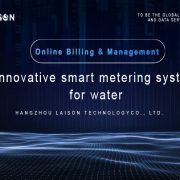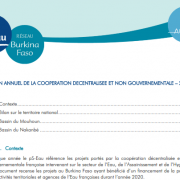The Yaounde Statement: AfWA Makes Recommendations for Non-Revenue Water (NRW) Management
The Cameroon Water Utilities Corporation (CAMWATER) organized an international Symposium jointly with the African Water Association (AfWA) and some partners, including LACROIX Sofrel, Technolog SA, Liason, etc. This event took place from January 26 to 27, 2023, in Yaoundé, Cameroon, under the theme: “Financial Viability of Water Utilities in Africa: Control of Commercial Losses and Fraud on the Drinking Water Distribution Network”.
The aim was to boost the financial performance of water utilities, through the control of commercial losses and fraud on the drinking water distribution networks of water utilities. Specifically, it was intended to provide an overview of the specific challenges faced by some water utilitites, to share some success stories, including technical and technological solutions to control losses, and to exchange with financial partners on financing options to stem these losses.
The following participants attended this event : General, Commercial, Technical and Financial Directors, Directors of Planning and Operation of water utilities in Central Africa, West Africa and East Africa, especially the Cameroon Water Utilities Corporation (CAMWATER, Cameroon), the Chadian Water Company (STE, Chad), the Water Distribution Company of Côte d’Ivoire (SODECI, Côte d’Ivoire), Ghana Water Company Limited (GWCL, Ghana), National Water & Sewerage Corporation (NWSC, Uganda), Lilongwe Water Board (LWB, Malawi). Some municipalities and institutions such as the United Nations Development Program (UNDP), ministerial departments and other WASH stakeholders were also represented.
After two days of discussions with the sharing of practical experiences on the theme of the Symposium, some recommendations were formulated and organized into a Statement. Thus, the Yaounde Statement on Non-Revenue Water (NRW) identifies some lines of actions to help fight against water fraud and water losses through the use of technical tools, capacity building, financing and adoption of a regulatory framework and appropriate policies. This Statement was presented to the Cameroon Minister of Water & Energy, at the close of the Symposium.
The contextual adaptation of the suggested solutions and their implementation within the water utilities might contribute to resource preservation, improved revenues and prepare the way for financing the extension of services for the benefit of populations, including the most vulnerable segments.
For record, this Symposium was set a day after the final workshop for restructuring the Scientific and Technical Council (STC) of the African Water and Sanitation Association (AfWASA), still in Yaoundé, Cameroon, from 24 to 25 January 2023, and hosted by the Managing Director of CAMWATER, AfWASA Vice-President for Central Africa.
Download the Yaounde Statement here.






